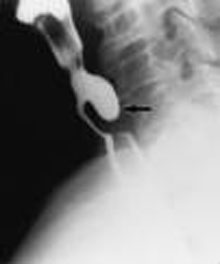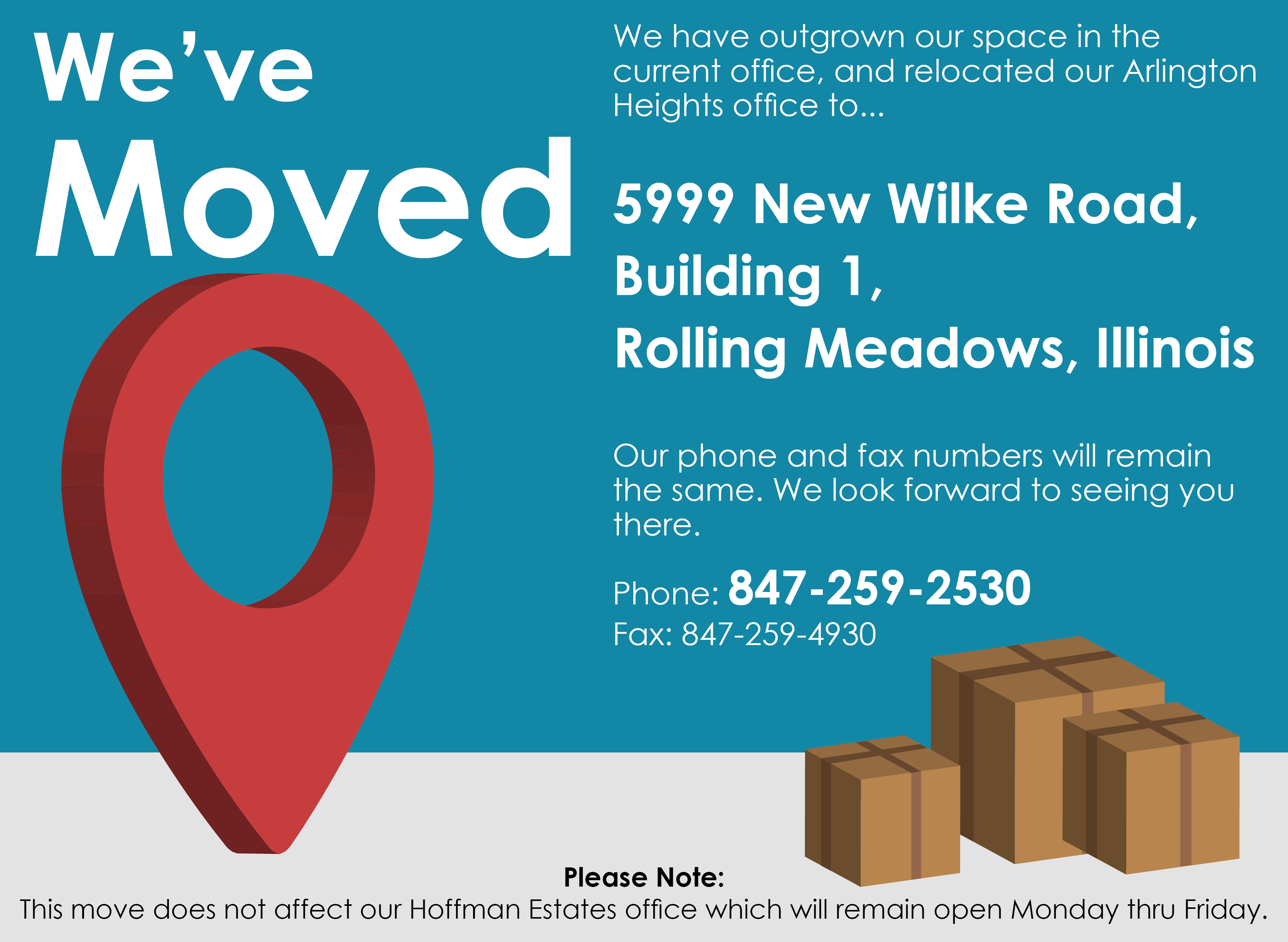CRICOPHARYNGEAL MYOTOMY/ENDOSCOPIC STAPLE or LASER DIVERTICULOTOMY/ ZENKER’S DIVERTICULECTOMY
Dysphagia (pronounced dis-FAY-juh) means trouble with swallowing. When we initiate a swallow, the upper esophageal sphincter (the cricopharyngeus muscle) briefly relaxes, allowing the passage of the food bolus into the esophagus. The cricopharyngeus (CP) muscle then immediately closes again to prevent regurgitation of food back up into the throat. Sometimes this cricopharyngeus goes into spasm. There are numerous causes of persistent cricopharyngeal spasm.You may have primary cricopharyngeal spasm, which suggests that the problem is confined to the muscle itself. Conversely, the CP spasm may be a part of a broader neuro‐muscular disorder ‐ as in muscular dystrophy, myositis, amyotrophic lateral sclerosis (Lou Gehrig’s disease), stroke, polio, myasthenia gravis, etc. Persistent spasm of the cricopharyngeus muscle prevents food and liquid from easily entering the esophagus. This causes trouble swallowing, choking, or food getting stuck in the throat. Patients often have to alter the quantity and consistency of food they eat, and frequently give a history of having to "wash down" every bite with some liquid. These symptoms can present gradually or with sudden onset.

X-ray with arrow pointing to Zenker's diverticulum
If cricopharyngeal spasm is left untreated for many years, it can lead to an out-pouching of the throat wall (the pharynx), into a sac. This sac, called a Zenker's diverticulum, can accumulate previously swallowed food and liquid. This will further aggravate the swallowing problem, causing coughing, choking, and regurgitation of foul material that was swallowed days or weeks earlier.
Dysphagia that is the result of persistent cricopharyngeal spasm and/or a Zenker's diverticulum is particularly amenable to surgical correction. The surgery is designed to release the tightened cricopharyngeal muscle, often in conjunction with removal of the Zenker's diverticulum sac. There are several highly successful options, and some patients may even be candidates for minimally invasive endoscopic repair. Depending on your individual condition, we may suggest performing the surgery endoscopically (with a telescope placed through the mouth). This technique, called “trans‐oral,” is sometimes performed with laparoscopic tools and sometimes with a laser. When appropriate, we may recommend an open approach (with an external neck incision). On occasion, despite attempting to perform the surgery endoscopically, technical reasons prevent the surgery from being performed this way. In this circumstance, we would then convert to an open approach. Prior to making a formal treatment plan, the various options will be discussed with you.
2 WEEKS PRIOR TO SURGERY: No anti‐inflammatory drugs are to be used for two weeks pre‐operatively. This includes Advil, ibuprofen, Naprosyn, Aleve, aspirin, or any other nonsteroidal anti‐inflammatory drug (NSAID’s). These medicines increase your risk of bleeding. Tylenol (acetaminophen) is not an anti‐inflammatory so it is fine to take. If you take any other daily blood thinners (such as Coumadin, warfarin, Plavix, clopidogrel, Lovenox, etc.), please be sure to notify your surgeon more than two weeks before surgery. That way, the medication can be safely discontinued under the supervision of your primary care physician or cardiologist well in advance of the surgery date.
NIGHT BEFORE SURGERY: No solid foods (that includes milk, cream etc.) for 8 hours prior to surgery. Typically this means no solid foods after midnight before the surgery. Small volumes of clear liquid may be drunk up to 4 hours prior to surgery (water, tea, Gatorade, coffee with NO milk or cream).
OPERATIVE CARE: As requested pre‐operatively, please refrain from aspirin and all NSAID’s for 2 weeks after surgery. We ask that you limit your activity to casual activities for up to 2 weeks. We ask that you do not perform activities that involve lifting more than 20 pounds, excessive bending, stooping, straining, or exercising during this time. We do encourage casual activities such as walking, etc. We encourage taking extra deep breaths every couple hours during the waking hours for a few days after surgery to decrease your risk of post‐operative lung infection. We allow showers 24 hours after your neck drain/drains have been removed, even if sutures or skin clips are still in place. Sutures or skin clips will typically be removed about seven days after surgery. Sometimes post‐operative antibiotics are prescribed. Pain medicine is usually prescribed to be taken on an as needed basis.
POST‐OPERATIVE DIET: Your surgeon will discuss with you what types of foods and liquids may be ingested after surgery. Serious complications are rare, but it is very important that you make us aware if any of the following problems listed below occur. The indications and risks of surgery, as well as expected outcomes, must be understood prior to proceeding with your surgery. In addition, you must understand your alternatives to the surgery. Your alternative is not to have the surgery performed, and continue with medical management of your problem. This would leave you in your current condition.
SPECIFIC SURGICAL RISKS / COMPLICATIONS:
NON‐RESOLUTION OF THE DYSPHAGIA (trouble swallowing) – As noted earlier in this document, there are many reasons why people have CP spasm. If you have other neurological problems, or problems with your esophagus (beyond the cricopharyngeal muscle), treating the CP spasm may only help to open the pharynx. However, the other problems may be significant enough to cause persistent difficulties with swallowing. It is for this reason that not all patients with CP spasm are candidates for this surgery. If your doctor has scheduled you for surgery, we feel that you have a very good chance of improvement in your swallowing function. On occasion however, despite a “successful surgery,” dysphagia persists. Please also be aware that in performing this surgery, we are not restoring the cricopharyngeal muscle back to normal function. We are dividing the fibers so that they are no longer able to squeeze the upper throat closed. If you have a Zenker’s diverticulum, we typically don’t remove the sac. Instead, we change the function of the throat so that gravity allows passage of food, liquids and saliva into the esophagus. There, it is then rhythmically pushed down into the stomach. Our expectations are that your swallowing function will be significantly improved with this surgery, but potentially not normal. If, for various reasons, the surgery does not allow you to swallow adequately to maintain your fluid and caloric needs, you may need a permanent feeding tube. As an alternative option to the surgery, if your swallowing is bad enough that you cannot maintain adequate nutrition, placement of a feeding tube is also a viable option.
BLEEDING – Minor bleeding either through the mouth or from the incision is typically not a problem; however heavy bleeding deeper in the neck can be very serious and can potentially cause difficulty with breathing. If not addressed in a timely fashion, it can possibly cause suffocation. Therefore, if excessive bleeding is noted, if you have sudden difficulty breathing, or if there is rapid expansion of your wound, call 911 immediately.
INFECTION – Wound incision infections are rare. However, since the surgery sometimes requires opening into the throat, there can be contamination of the bacteria from the throat into the clean environment of the neck. If the opening is performed at the time of the surgery (such as excision of a large sac), this will be managed with surgical closure of the defect. Typically then, the patient will then need a temporary feeding tube placed through the nose which goes into the stomach, and an extended hospital stay (about a week). Usually, the patient will heal fine. If the opening into the throat went unnoticed, or if an opening into the neck developed post‐operatively and saliva leaked into the neck (a salivary fistula), this could potentially be a very dangerous infection. Serious, potentially fatal neck and chest infections could develop that would need extensive treatment. Fortunately, this serious infection is exceedingly rare, and if identified in a timely fashion, will usually still have a good outcome.
HOARSENESS – The nerve that controls movement of the vocal cord is placed at risk during this surgery, especially with an open procedure. Injury to this nerve would lead to a hoarse voice, and possibly trouble with swallowing. This injury is also very rare. If it was to occur, additional surgery might be offered to improve the voice and swallowing problems.
RECURRENCE – Especially with the endoscopic procedure, there can be an approximate 10% chance of recurrence of the Zenker’s diverticulum. If the problem was to recur, it usually would take several years for this to happen. If there was initial success, then typically the endoscopic repair can be repeated.
CHIPPING OF TEETH – On rare occasion, despite the use of tooth protectors during the surgery, the endoscopic procedure may result in one or more of your teeth might get chipped. If so, you would need to see your dentist after the procedure for dental restoration.
NUMBNESS OR WEAKNESS OF YOUR TONGUE / LIPS – If this occurs, also only a problem if the endoscopic procedure, we expect this to be temporary. This occurs due to the telescope pressing against the side or top of your tongue or lips. This can occur despite the gentlest approach during the procedure. Pressure from the scope against the side of your tongue can also rarely cause a temporary weakness of the tongue.
As with any type of surgery, the risks of anesthesia such as drug reaction, breathing difficulties and even death are possible. Please discuss these risks with your anesthesiologist. Fortunately, with this procedure, anesthetic problems are exceedingly rare.
At Suburban Ear, Nose and Throat Associates, Ltd., we go to great lengths to try to help you understand your plan of care. If at any time during your care you have questions or concerns, please call us at 847‐259‐2530.
For more information
- Swallowing Trouble (American Academy of Otolaryngology—Head and Neck Surgery)
- Swallowing Disorders (U.S. National Library of Medicine and the Natinoal Institutes of Health)
- Dysphagia (National Institute on Deafness and Other Communication Disorders)
- Swallowing Disorders (National Institute of Neurological Disorders and Stroke)
- Dysphagia (The Merck Manual for Healthcare Professionals)
